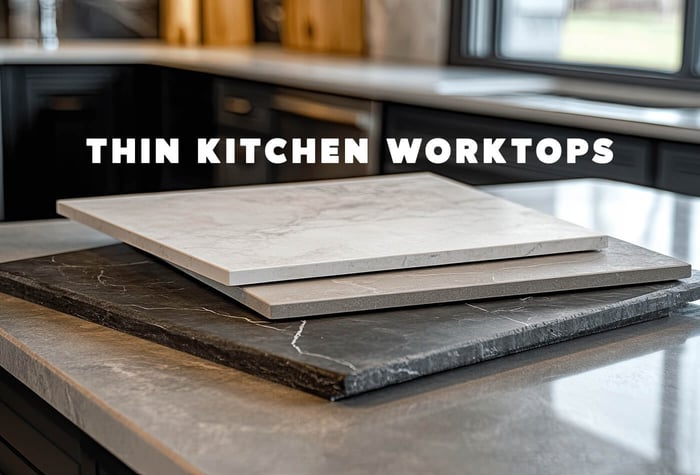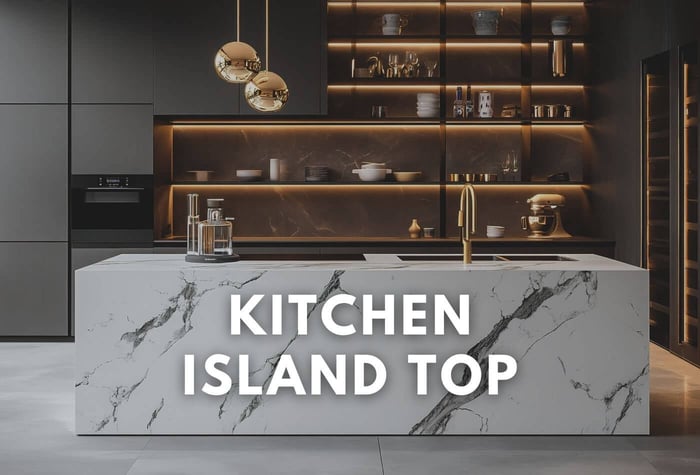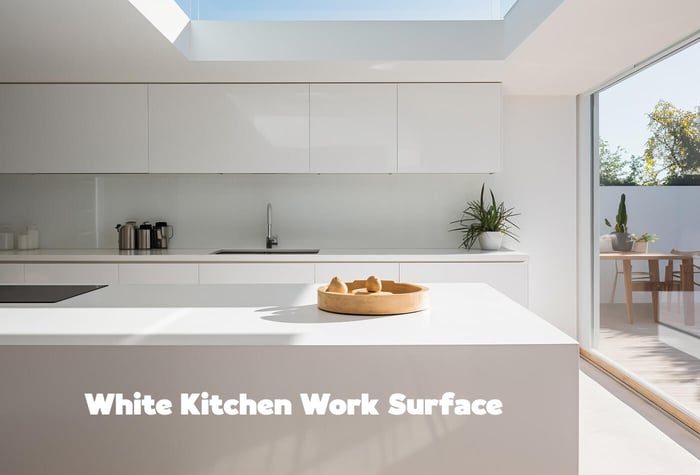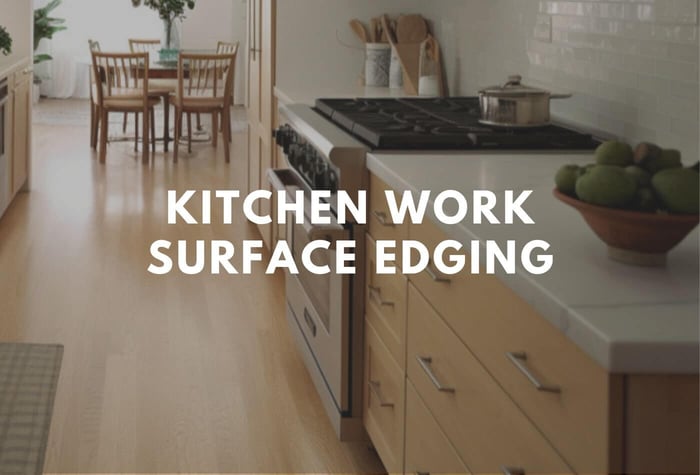Table of Contents
- Do Homeowners Install Thin Kitchen Worktops?
- Choosing Slim Kitchen Worktops?
- Are Thin Kitchen Worktops Durable and Safe?
- Are Thin Worktops Cheaper Than Thick Ones?
- Have You Made a Mistake By Choosing Thin Worktops for Kitchen?
- Selecting Thin Kitchen Worktops - Popular Materials
- Design Ideas: Styling Thin Kitchen Worktops
- Thickness Matters: Choosing the Right Worktop Profile
- Contact Worktop Installation Experts - Avoid Costly Mistakes
- Conclusion: Should You Choose Thin Kitchen Worktops?
- Frequently Asked Questions and Answers
Thin kitchen worktops are becoming a popular choice for UK homeowners seeking a modern, clean look without compromising durability. With high-performance materials like quartz, granite, and porcelain, slim worktops offer a stylish, strong, and space-efficient solution.
Do Homeowners Install Thin Kitchen Worktops?
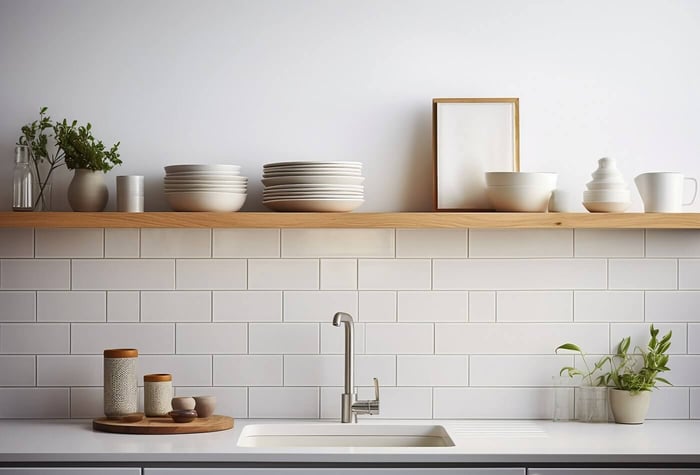
Slim kitchen worktops, typically between 12mm and 20mm, are gaining traction across UK households. Here’s why:
Their minimalist profile complements modern and contemporary kitchen styles.
Ideal for compact kitchens found in flats and townhouses.
Enhances features like floating shelves, handleless cabinetry, and under-cabinet lighting.
Perfect match for premium stone finishes such as quartz and porcelain.
Offers a clean and sophisticated look with space-maximising benefits.
Choosing Slim Kitchen Worktops?
The standard thickness for thin stone worktops ranges from 12mm to 20mm. While 12mm is considered the thinnest practical option, anything thinner may compromise strength.
Material-specific Guidelines:
Porcelain: Can go as thin as 12mm without losing strength.
Quartz: 12mm to 20mm thin kitchen worktops are ideal for maintaining durability.
Granite: Usually starts at 20mm due to its natural brittleness.
Pro Tip: Always consult your stone worktop supplier or installer before opting for ultra-thin designs. Structural support and overhang limitations must be considered.
Are Thin Kitchen Worktops Durable and Safe?
Yes, provided they are crafted from high-quality materials and installed professionally.
Material Durability Breakdown:
Quartz (12–20mm): Scratch-resistant, heat-resistant, and stain-proof. Requires quality edging.
Granite (20mm): Naturally tough but may need extra support.
Porcelain (12mm): Strong, heatproof, and UV-resistant.
Safety Tips:
Ensure your thin kitchen worktops have proper cabinet support, especially for cut-outs (e.g., sinks and hobs).
Use reinforcement brackets for floating or extended designs.
Also read: What Thickness Worktop Is Best for Your Kitchen?
Are Thin Worktops Cheaper Than Thick Ones?
Not necessarily. While thin worktops use less material, fabrication can be more intricate, especially for premium stones like quartz or porcelain.
Cost Breakdown:
Material Cost: 20mm stone can be slightly cheaper than 30mm.
Fabrication Cost: Often similar for both thicknesses due to edge finishing and labour.
Installation Cost: Comparable, labour doesn't change much between 20mm and 30mm.
If budget is your concern, 20mm worktops strike the right balance between aesthetic appeal, long-term durability, and cost efficiency.
Have You Made a Mistake By Choosing Thin Worktops for Kitchen?
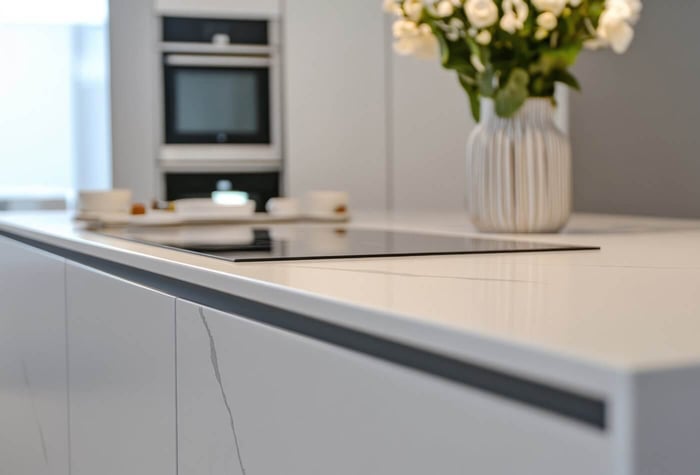
Not at all, especially if you understand the pros and cons of thin kitchen worktops and how they suit your overall kitchen layout. Choosing slimline countertops doesn’t mean compromising on performance or longevity. In fact, with the right material, such as thin quartz worktops or ultra-compact porcelain, you can achieve a high-end aesthetic without sacrificing durability.
These sleek worktops are incredibly popular in contemporary kitchen renovation projects across the UK because they make even small spaces feel more open and airy. Plus, they’re lightweight, making them easier to handle during installation, and are ideal for modern design elements like under-mounted sinks and integrated hobs.
However, it’s important to be aware of a few trade-offs. Slim worktops offer limited edge profile options compared to thicker slabs and may require additional support underneath, particularly around overhangs, hob cut-outs, or sink areas. In high-traffic kitchens, their edges can be more prone to chipping if knocked with heavy items, although this is rare with quality stone surfaces.
At Work-tops.com, we offer a curated selection of thin kitchen worktops, including expertly fabricated quartz, granite, and porcelain options. Our team ensures every installation is tailored for both safety and style, so you don’t have to question your design choices. Whether you're updating your flat or planning a full-scale kitchen renovation, slim worktops are a smart and stylish investment.
Let us simplify the Pros and Cons below for a quick read.
Pros:
Lightweight, easier to handle and install.
Sleek, modern appearance.
Maximises visual space.
Works well with under-mounted sinks and integrated appliances.
Cons:
Limited edge profile options.
It may require extra cabinetry reinforcement.
More susceptible to edge chipping if mishandled.
Explore our extensive range of thin kitchen worktops and benefit from expert installation support.
Selecting Thin Kitchen Worktops - Popular Materials
When selecting thin kitchen worktops, material choice is crucial for ensuring the right mix of strength, style, and longevity. Let’s dive deeper into the most popular materials used in UK homes for slimline kitchens.
Let’s discuss the material and benefits below:
1. Quartz 12–20mm:
A leading favourite for thin worktops in the UK, quartz is a non-porous, engineered stone that offers excellent stain resistance and minimal maintenance. Available in a wide palette of colours and patterns, thin quartz worktops suit both minimal and luxurious kitchen styles. It’s an ideal material for busy families or those undertaking a modern kitchen refurbishment.
2. Porcelain 12mm:
Ultra-compact and highly durable porcelain slabs are perfect for slim surfaces. They're heat resistant, UV-stable (great for kitchens with natural light), and don’t stain easily. Thin porcelain worktops are lightweight yet surprisingly strong, ideal for contemporary or industrial-style kitchens.
3. Granite 20mm:
Though naturally heavier than quartz or porcelain, 20mm granite offers a classic, elegant look. Its unique veining patterns bring a sense of depth and natural luxury. While it may require extra support during installation, it's a durable option for those who prefer natural stone aesthetics.
4. Marble typically 20mm+:
While traditional marble is more porous and softer than other stones, making it less suited to everyday kitchens, some homeowners still prefer its timeless, luxurious look. For slimline installations, we recommend using engineered marble or reinforcing natural marble to enhance durability. If you don’t mind gentle wear and a more “lived-in” patina over time, marble could be a stunning focal point.
Each material suits different tastes, uses, and budgets, but all are solid choices for slimline kitchens in the UK.
Design Ideas: Styling Thin Kitchen Worktops
Thin worktops inspire clean, minimalist designs. Here are some styling tips:
Pair with floating shelves for an airy, open feel.
Integrate sinks or hobs seamlessly.
Pair with chunky island worktops for a striking contrast.
Add LED lighting beneath worktops or splashbacks.
Go bold with mitered waterfall edges.
Thickness Matters: Choosing the Right Worktop Profile
You can see below what thickness is best for what purpose when choosing the worktop thickness
12mm - Ultra-minimalist, best for modern kitchens.
20mm - Balanced design with added visual weight.
30mm - Traditional, bold styles (not considered “thin”).
Remember: it's not just about aesthetics; weight, support, and durability all play a role.
Contact Worktop Installation Experts - Avoid Costly Mistakes
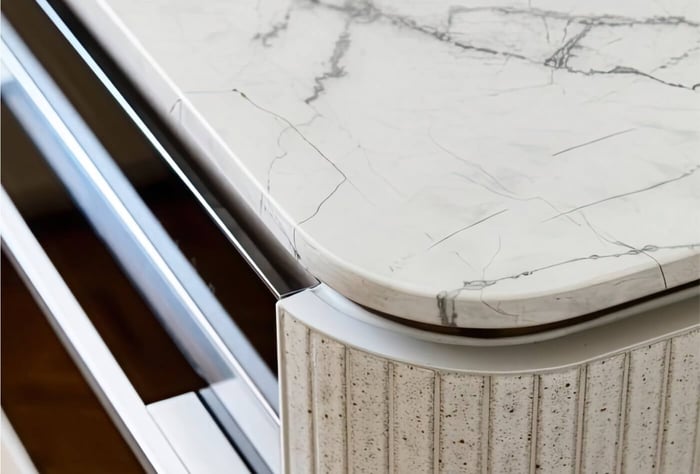
Slim and thin kitchen worktops are durable, safe, and stylish when chosen and installed with expert guidance. Avoid costly installation mistakes by speaking to our specialists today. Call 0330 113 5868 for professional advice and a flawless finish.
Or send your inquiry using the following methods, as it suits you
Send Your Details - Get a Free Quote.
Email us at info@work-tops.com.
Conclusion: Should You Choose Thin Kitchen Worktops?
If your goal is a sleek design without compromising strength, then thin kitchen worktops are a smart and stylish choice, especially for modern UK homes.
Here’s why:
Offers a premium, high-end look
Ensures durability with top materials
Ideal for space-saving layouts
It matches seamlessly with contemporary cabinetry. At Work-tops.com, we specialise in the supply and installation of thin quartz, granite, and porcelain kitchen worktops. Our professional team ensures perfect finishes for every home.
Frequently Asked Questions and Answers
Are Thin Kitchen Worktops Strong Enough for Daily Use?
Yes. When made from materials like quartz or porcelain, they are very durable.
Can I Install Thin Worktops Over Existing Cabinets?
Yes, but proper support must be ensured, especially for 12mm profiles.
Are Thin Worktops Cheaper Than Thick Ones?
Not always. Thinner profiles require careful fabrication, which can offset material savings.
Do Slimline Worktops Suit Traditional Kitchens?
Yes, especially when paired with classic textures like marble-look quartz.

